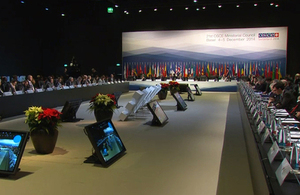UK Statement to the 21st OSCE Ministerial Council
The Ukraine crisis has demonstrated how the OSCE can make a difference

OSCE Ministerial Council plenary in Basel, Switzerland, 2014
21st OSCE Ministerial Council, Basel, Switzerland
4 December 2014
Thank you Mr Chairman.
I would also like to thank President Burkhalter and our Swiss hosts, for their hospitality here in Basel and for their hard work and dedication throughout their 2014 Chairmanship. I commend Switzerland for the way they have handled the most challenging OSCE Chairmanship in many years.
Twelve months ago we gathered in Kyiv, against the backdrop of the Ukrainian people exercising their democratic rights to peaceful protest on the Maidan, demanding change.
Ukraine now has a new President and a new pro-EU and reformist parliament. They must seize this opportunity to implement much needed, deep-rooted political and economic reforms, to make a clear break from the past and give the Ukrainian people the stability, democracy and prosperity that they deserve.
This is not easy. Ukraine continues to face significant challenges as a result of the interference of its neighbour. In March, we saw an illegitimate referendum, and Russia’s illegal annexation of Crimea. Neither we, nor any other state which uphold the OSCE principles to which we are all committed, will recognise this clear violation of international law.
Since then, Russian interference in Ukraine has further increased, through troops, weapons and disinformation, causing nothing but misery for the people of the east. 298 innocent people died when Malaysian Airlines flight 17 was shot down over eastern Ukraine.
Throughout these extraordinary events, the OSCE has been more prominent than for many years. The Ukraine crisis has demonstrated how the OSCE can make a difference.
Its institutions were quickly on the ground, in Crimea and elsewhere. Its election observers have undertaken two large-scale missions. And the Special Monitoring Mission, launched in quick time, has been operating for 8 months in the face of significant challenges in eastern Ukraine.
The UK has been a strong supporter of the Mission’s work throughout. We expect to hand over 10 armoured vehicles in Kyiv next week, in addition to our ongoing staffing and financial commitment. We encourage all present here in Basel to mirror this support.
But we still see the SMM obstructed. Unable to move freely across eastern Ukraine or to provide the full and effective monitoring of the Ukraine-Russia border that is needed to stabilise the situation. It must have the access and security it needs to undertake the tasks assigned to it.
The OSCE has an important role to play, but it cannot solve the crisis alone. A solution can come only through a political process. The Minsk agreements provide a roadmap, but so far only one party is living up to its commitments.
Russia must do more; it must withdraw personnel and weapons, cease supply of the separatists, and enable the border to be secured. It must engage constructively with Ukraine and international organisations. The Ukrainian people have the right to live peacefully in a sovereign state, free from the destabilising meddling of their neighbour.
There is no doubt that the situation in Ukraine represents the most serious crisis in Europe since the end of the Cold War. The OSCE has shown itself to be a forum for both action and dialogue in response. We need to make the best use of it.
It is not only in Ukraine where we see instability. The United Kingdom is also concerned about the escalation in violence in the Nagorno-Karabakh, including the recent shooting down of a helicopter and delays repatriating the deceased crew. This conflict has the potential to further destabilise the region. I urge both sides to work constructively with the Minsk Group Co-Chairs to reduce tensions and build trust in order to find a peaceful solution.
I call on all States to fully engage with the OSCE’s mechanisms, particularly its confidence-building measures on arms control, and its institutions who promote the fundamental rights and freedoms that should apply to all our peoples.
I again commend the Swiss Chairmanship-in-Office for their handling of this most difficult year. I look forward to working with Serbia as we continue to face these significant challenges during their Chairmanship in 2015.